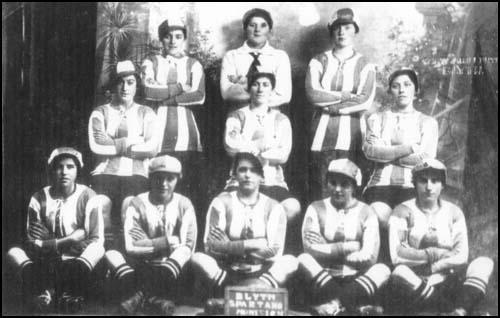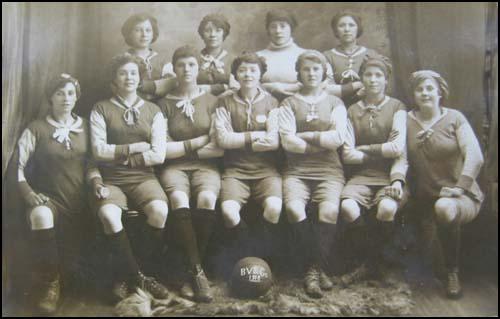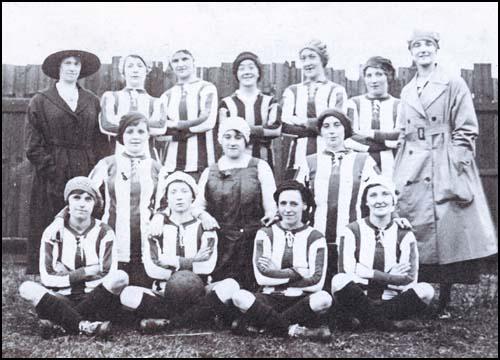
|

|
| This Web Site is dedicated to the Memories & Spirit of the Game as only Ken Aston could teach it... |
| Enjoy, your journey here on... KenAston.org |
| Ken Aston Referee Society ~ Football Encyclopedia Bible |
Munitionettes
|
| Source - References |
| On 4th August, 1914, England
declared war on Germany. The role of women changed dramatically during
the First World War. As men left jobs to fight overseas, they were
replaced by women. Women filled many jobs brought into existence by wartime needs. As a result the number of women employed increased from 3,224,600 in July, 1914 to 4,814,600 in January 1918. Nearly 200,000 women were employed in government departments. Half a million became clerical workers in private offices. Women worked as conductors on trams and buses. A quarter of a million worked on the land. The greatest increase of women workers was in engineering. Over 700,000 of these women worked in the highly dangerous munitions industry. |
 Edward Skinner, For King and Country (1916) |
|
The women working in factories began to play football during
lunch-breaks. Teams were formed and on Christmas Day in 1916, a game
took place between Ulverston Munitions Girls and another group of local
women. The munitionettes won 11-5. Soon afterwards, a game between
munitions factories in Swansea and Newport. The Hackney Marshes National
Projectile Factory formed a football team and played against other
factories in London. |
 Blyth Spartans Munition Girls - Munitionette Cup Winners 1918 |
|
David Lloyd George, the British Prime Minister, encouraged these games
as it helped reinforce the image of women doing the jobs normally done
by men now needed to fight on the Western Front. This was especially
important after the introduction of conscription in 1916. These matches
also helped to raise money for wartime charities. |
 Vaughan Ladies in 1918 |
|
Alfred Frankland worked in the offices of the Dick, Kerr factory in
Preston. During the First World War the company produced locomotives,
cable drums, pontoon bridges, cartridge boxes and munitions. By 1917 it
was producing 30,000 shells per week. Frankland used to watch the young
women workers from his office window, kicking the ball around in their
dinner-breaks. Alice Norris, one of the young women who worked at the
factory later recalled these games: "We used to play at shooting at the
cloakroom windows. they were little square windows and if the boys beat
us at putting a window through we had to buy them a packet of Woodbines,
but if we beat them they had to buy us a bar of Five Boys chocolate." Grace Sibbert eventually emerged as the leader of the women who enjoyed playing football during the dinner-breaks. Born on 13th October, 1891, Grace's husband took part in the Battle of the Somme and in 1916 had been captured by the German Army and was at the time in a POW camp. Alfred Frankland suggested to Grace Sibbert that the women should form a team and play charity matches. Sibbert liked the idea and Frankland agreed to became the manager of the team. Frankland arranged for the women to play a game on Christmas Day 1917, in aid of the local hospital for wounded soldiers at Moor Park. Frankland persuaded Preston North End to allow the women to play the game at their ground at Deepdale. It was the first football game to be played on the ground since the Football League program was cancelled after the outbreak of the First World War. Over 10,000 people turned up to watch the game. After paying out the considerable costs of putting on the game, Frankland was able to donate £200 to the hospital (£41,000 in today's money). |
 The Dick Kerr team before their first game on 25th December, 1917. Grace Sibbert is second from the left with the ball on her lap. |
|
Dick Kerr's beat the Arundel Courthard Foundry, 4-0. They went onto play
and defeat other factories based in Barrow-in-Furness and Bolton. The
stars of the team included the captain, Alice Kell, the centre-forward,
Florrie Redford, and the hard-tackling defender, Lily Jones. At the end of the First World War most women lost their jobs in the munitions factories and munitionette teams came to an end. David J. Williamson argued in Belles of the Ball (1991): "Nor surprisingly, it was extremely difficult for many men to accept the idea of ladies playing what had always been regarded as a male preserve, their sport. Those who had been away at the front during the Great War would have had no real idea as to how the country was changing in their absence; how the role of their womenfolk within society was beginning to change quite dramatically, responding to the opportunity they had been given." |
| Source - References |
|
(1) James Cannon, speech, New York City (23rd December, 1921) We have had for two years many struggles and much strife in our ranks. This was inevitable after the great upheaval of the World War and the Russian Revolution that shook all of our organizations to their foundations and put every one of our old theories and dogmas to the acid test. Every one of us was compelled to revise some of his theories and some of his plans. It was no more than natural, I might say it was inevitable, that in the beginning we should have some confusion and some disintegration. |
| +-+ BACK TO TOP +-+ | |